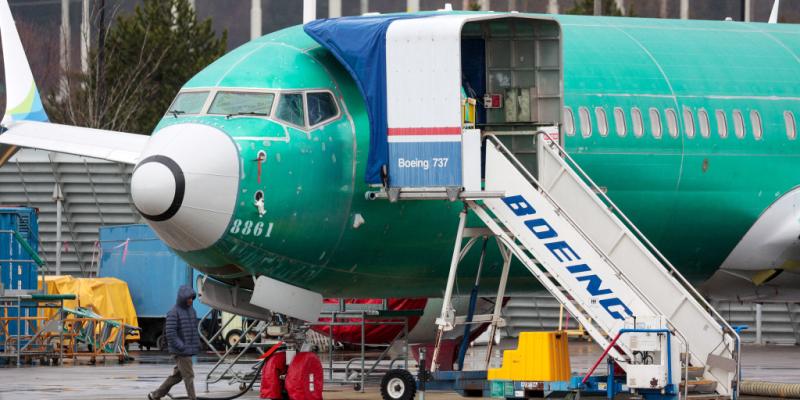Another Boeing Max mishap: NTSB probes 'stuck' rudder pedals on United Airlines flight to New Jersey
Category: News & Politics
Via: perrie-halpern • last year • 5 commentsBy: Marlene Lenthang and Jay Blackman



An investigation is underway into a Boeing-manufactured United Airlines plane that experienced "stuck" rudder pedals during a landing rollout last month.
Flight 1539, which had flown from Nassau, Bahamas, experienced the mishap after touching down at Newark Liberty International Airport in New Jersey on Feb. 6, according to a National Transportation Safety Board preliminary report released Thursday.
The captain of the Boeing 737-8 aircraft reported that during the landing rollout, which occurs after touchdown and before the plane slows to taxi speed, the rudder pedals did not respond to the application of foot pressure while there was an attempt to "maintain the runway centerline," the report said.
Instead, the pedals were "stuck" in their neutral position.
"The captain used the nose wheel steering tiller to keep the airplane near the runway centerline while slowing to a safe taxi speed before exiting the runway onto a high-speed turn-off," the report said.
During the high-speed turnoff, the captain asked the first officer to check his rudder pedals and he reported the same issue. Shortly after that, the rudder pedals began to operate normally, the report said.
The aircraft, carrying 155 passengers and 6 crew members, was able to park safely. No one was injured.
The flight crew then notified United Airlines maintenance of the flight control malfunction and the plane was removed from service for maintenance and troubleshooting.
A review of the flight's data recorder corroborated the pilot's account of what happened, and showed that the rudder surface position remained near its neutral position during the landing and rollout, even though the force inputs to the rudder pedals were increasing, the report said.
The data showed that about 30 seconds after touchdown, a "significant pedal force input was observed along with corresponding rudder surface movement. Afterward, the rudder pedals and rudder surface began moving as commanded and continued to function normally for the remainder of the taxi."
Three days later, on Feb. 9, United conducted a test flight on the event airplane at Newark, and "was able to duplicate the reported rudder system malfunction."
The NTSB was notified about the flight control issue after the flight test and an incident investigation was opened with the involvement of the Federal Aviation Administration, Boeing and Collins Aerospace.
A post-incident inspection of the rudder control system "found no obvious malfunctions with the system." When some rudder system components were removed, United conducted a second test flight and found that the rudder control system operated normally.
The investigation is ongoing.
Boeing said in a statement Thursday: "We worked closely with United Airlines to diagnose the rudder response issue observed during two 737-8 flights in early February. With coordination with United, the issue was successfully resolved with the replacement of three parts and the airplane returned to service last month."
The February incident was the only report of this rudder pedal issue Boeing received in the 737 MAX fleet, the company said. The rudder pedal system on the aircraft is identical to that of the 737 NG. Boeing said it was aware of two similar past occurrences on the 737 NG model, both in 2019, which were resolved with component replacements in both cases.
United Airlines said Thursday, "We'll continue to work with Boeing, the NTSB and the FAA on next steps for these aircraft."
The airline said the parts involved in the rudder pedal issue are related to a landing feature that was not selected by United and are only present on nine United aircraft that were originally built for other airlines. Those parts have since been replaced.
This marks yet another issue with Boeing's already highly scrutinized Max program after a Boeing-made Alaska Airlines plane door panel blew out midair over Portland, Oregon, on Jan. 5.
A preliminary investigation by the NTSB found that bolts had not been installed on that door plug.
The incident prompted the FAA totemporarily ground all Boeing 737 Max 9 airplanes operating in the U.S. and subsequently increase oversight over Boeing aircraft production.
On Monday, a Boeing 737-900 plane flown by United Airlines from Texas to Florida made an emergency landing after bright orange flames were seen shooting out of the plane's engine.





Although most people are pretty unhappy about the problems with Boeing, I'll bet the executives at Airbus are breaking out the champagne.
According to research by Harvard University, flying in the US, Europe, and Australia is significantly safer than driving a car. Your odds of being in an accident during a flight is one in 1.2 million, and the chance of that being fatal is one in 11 million. Comparatively, your chances of dying in a car crash are over 200,000 times higher, averaging around one in 5,000.
How Flying Today Is Safer Than At Any Time In The Past (simpleflying.com)
Transport Fatalities by Mode, United States, 1970-2020 | The Geography of Transport Systems (transportgeography.org)
I fully support regulation of services to the public but a little reality check is also in order, when we look at these issues.
Either failed electronics or maintenance issue?
Meanwhile at SFO, wheel falls off 777, obviously Boeings fault. /s
they jinxed.
hope it doesnt get worse